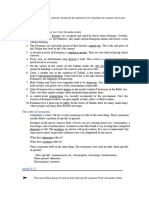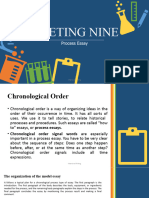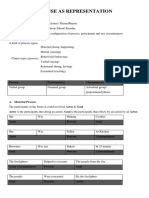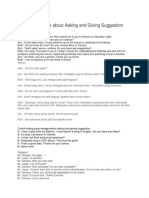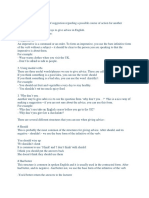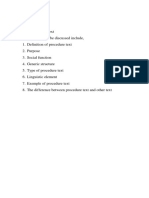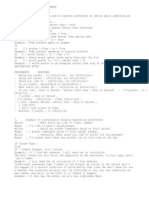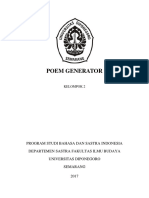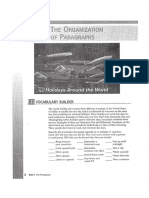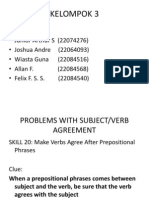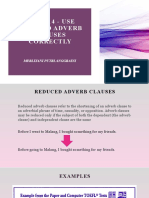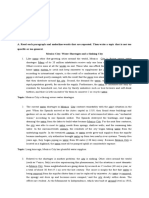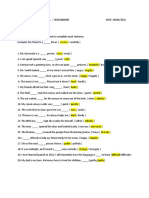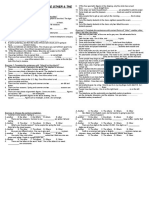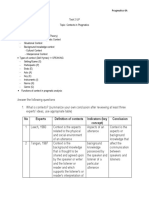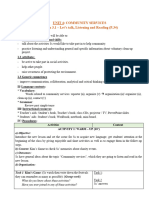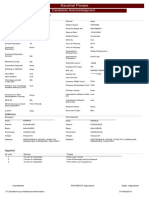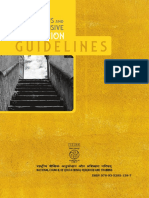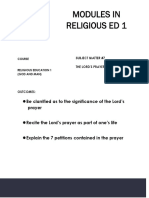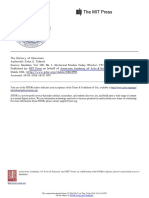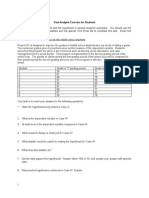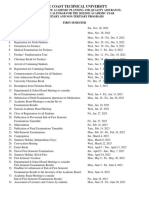v Sentence and Paragraph Writing
Chapter 4 Simple Sentences
A sentence is an expression of a complete thought and contains a subject, verb, and ending
punctuation.
In general, a sentence names something (a subject) and then states something about that subject. The
part of the sentence that “talks” about the subject is the predicate (at least a verb and possibly more words
that help describe the subject). A sentence also must have ending punctuation.
The subject is a noun or pronoun that identifies the person, place, or thing the sentence is about. The
subject does the action of an action verb or comes before a linking verb in a statement. A sentence may
contain a compound subject. For example
Mary and Alice went to the store.
London and New York City are both large cities.
The verb is an action word that tells what the subject if doing. A sentence may also contain compound
verbs, such as:
Bill watches TV and reads every night before going to sleep.
Japan manufactures and exports many consumer products.
Some verbs are not action verbs but linking verb. A linking verb is a verb that connects (or “links”) a
subject to a word or words that name or describe it. It indicates a state of being. The most commonly used
linking verbs are be, become, seem, appear, look, feel, grow, smell, and taste.
Review the paragraph below. (the subjects are in blue and the verbs are in red)
Jerry and Jenny Chen are students at the Shanghai International School. They are two of
the over five-hundred foreign students there. Their father owns and manages a big chemical
company. After completing high school Jerry and Jenny hope to study business at university
so they can join their father’s business. They know they will need to learn English well so they
can help the business grow internationally.
Exercise 4.1
Read the following paragraph and circle the subject(s) and underline the verb(s) in each sentence.
Jenhua is a high school student at the Tongnae women’s college. She lives in Pusan,
but she was born in a small town near Daegu. She lives with her father and mother. She has
one brother and one sister. Her brother is a doctor, and her sister studies English literature at
Pusan University of Foreign Languages. Jenhua wants to go to Korea University. She enjoys
studying, and she also likes working out at the gym.
16
� v Sentence and Paragraph Writing
Chapter 4 Simple Sentences
Compound Subjects
When two or more nouns are used as the subject of a sentence, the sentence has a compound
sentence.
Exercise 4.2
Rewrite each sentence to make the subject compound. Change all the necessary words.
Example: Akiko is a student.
Akiko and Maria are students.
1. My brother lives in an apartment in Paris.
__________________________________________________________________________
My brother and my grandparents live in an apartment in Paris.
2. My mother speaks six languages.
__________________________________________________________________________
My mother and I speak six languages.
3. English is my favorite subject.
_________________________________________________________________________
English and Physical Education are my favorite subjects.
Exercise 4.3
Rewrite these sentences with a singular subject. Don't forget to make the verb agree with the subject.
Example: My mother and father like rock climbing.
My father likes rock climbing.
1. My friend and I want to go shopping.
__________________________________________________________________________
My friend wants to go shopping.
2. My oldest brother and my youngest sister are married.
__________________________________________________________________________
My oldest brother is married.
3. My mother and father live in Rome.
__________________________________________________________________________
My father lives in Rome.
4. My friends and I eat lunch in the student cafeteria.
__________________________________________________________________________
I eat lunch in the student cafeteria.
17
� v Sentence and Paragraph Writing
Chapter 4 Simple Sentences
Exercise 4.4
Write an S (subject) or V (verb) where the question marks are to tell what is missing. Then write the
missing words next to the question marks.
Hospitals ? _______
V - are places where people go when they are very sick. People also ? _______
V - be
there when they have been hurt or injured in an accident. ? _______
S - It can be expensive unless
you have insurance. Most ?S_______
- people hope they never have to go to a hospital.
Sentence Fragments
Many beginning writers frequently write sentence fragments- because they look like sentences, but are
not.
A fragment is part of a sentence presented as if it were complete sentence (subject + verb). A fragment
may be missing a subject or verb (or both). A fragment is an incomplete sentence and is grammatically
incorrect.
Fragments can be corrected with the following methods:
A) You can correct a fragment, by giving it a subject and/or verb.
Jenny attends several classes at her university. For example, English literature, listening,
and speech. [fragment, no subject]
Jenny attends several classes at her university. For example, she studies English literature,
listening, and speech. [corrected complete sentence]
B) You can connect a fragment to a sentence.
Dr. Yum enjoys teaching classes. And writing books. [fragment]
Dr. Yum enjoys teaching classes and writing books. [correct]
A beautiful log cabin, for example, is correct English, but it is not a sentence because it doesn’t have a
verb. A beautiful log cabin sits on top of the mountain is a complete sentence because it has both a
subject and verb and expresses a complete thought.
Sometimes the subject of a sentence is not written, but is understood. “Come to my office after class.” is a
complete sentence. This is a command or imperative sentence. The subject you is understood by both
the writer and reader (or speaker and listener) and the sentence really means: “You come to my office
after class”.
18
� v Sentence and Paragraph Writing
Chapter 4 Simple Sentences
Exercise 4.5
Read the phrases below and mark the fragments with and F and the complete sentences with S.
Example: __F__ A beautiful log house.
____1.
S He walks home daily. ____2.
S He walks. ____3.
S Let’s go!
____4.
F The large apartment. ____5.
S Eagles soar. ____6.
F Is smart.
____7.
S What do you want? ____8.
S What time is it? ____9.
F Stop!
____10.
F Okay ____11.
F Drives a big car. ____12.
F When?
____13.
S Please don’t go. ____14.
S She’s a teacher. ____15.
F Too hot!
____16.
S I don’t know how to. ____17.
F Before midnight. ____16.
F Great!
____19.
S Do you understand? ____20.
F Too much homework.
Simple sentences with “be verbs”
Some of the simplest sentences you will write will use the verb “be”. There are three simple present tense
‘be verbs’- is, am and are.
Use ‘is’ with singular subjects My house is in Pusan. (singular)
Use ‘are’ with plural subjects. There are four cars in the garage. (plural)
Use ‘am’ with I I am a student. (I)
Exercise 4.6
Write simple sentences with the correct ‘be’ verb using the following nouns and verbs. Be sure to use
correct capitalization, punctuation, and articles.
Structure: Subject + be + Noun
Example: cats / animals Cats are small animals.
1. i / architect
________________________________________________________________________
I am an architect.
2. plates and bowls / dishes
________________________________________________________________________
Plates and bowls are dishes.
3. she / doctor
________________________________________________________________________
She is a doctor.
4. seoul and tokyo / big city
________________________________________________________________________
Seoul and Tokyo are big cities.
19
� v Sentence and Paragraph Writing
Chapter 4 Simple Sentences
5. i / author
________________________________________________________________________
I am an author.
6. jackie chan / actor
________________________________________________________________________
Jackie Chan is an actor.
Exercise 4.7
Rewrite all the following sentences by changing the nouns to plural form. Be sure to use the correct form
of the verb. Use the simple present tense and correct capitalization and punctuation.
1. (chimpanzee) (be) smart
_________________________________________________________________________
Chimpanzee are smart.
2. the (tree) (have) brown (leaf)
_________________________________________________________________________
The trees have brown leaves.
3. the (car) (be) clean
_________________________________________________________________________
The cars are clean.
4. their (house) (be) very big
_________________________________________________________________________
Their houses are very big.
5. the (person) next door (be) very noisy
________________________________________________________________________
The people next door are very noisy.
Exercise 4.8
Rewrite the following sentences by changing them from singular to plural or plural to singular. Correct
capitalization and punctuation should be used.
1. schools are for education
_________________________________________________________________________
School is for education.
2. a telephone is a useful tool
_________________________________________________________________________
Telephones are useful tools.
3. apples are tasty
_________________________________________________________________________
An apple is tasty.
4. whales are mammals
_________________________________________________________________________
A whale is mammal.
5. mothers know what is best for their children
________________________________________________________________________
A mother knows what is best for her children.
20
� v Sentence and Paragraph Writing
Chapter 4 Simple Sentences
Negative form of “be verbs”
Some of the most simple sentences you will write will use the verb “be”. Be connects or links the subject
to more than just nouns, as in the previous exercise, but also to an adjective or a place. On the previous
pages we practiced writing with be, now we will practice using it in the negative form.
The negative form: Subject + be + not + adjective/noun/place
Note correct usage of first, second, and third person.
Adjectives Nouns Places
I am (not) tall. I'm (not) a Canadian. I'm (not) at work.
He is (not) handsome. He's (not) a professor. He is (not) here.
We are (not) smart. We're (not) students. We are (not) in Seoul.
Exercise 4.9
Write sentences with the words below. Use the correct form of be.
1. I / be / not / at school
_________________________________________________________________________
I am not at school.
2. you / be / a student
_________________________________________________________________________
You are a student.
3. the students / be / not/ in class
_________________________________________________________________________
The students are not in class.
4. my office / be / the 3rd floor / on
_________________________________________________________________________
My office is on the 3rd floor.
5. frogs / be / not / fish
________________________________________________________________________
Frogs are not fish.
6. Dr. Park and I / be / friends
________________________________________________________________________
Dr. Park and I are friends.
7. I / be / student / good / a
________________________________________________________________________
I am a good student.
8. we / be / hungry
________________________________________________________________________
We are hungry.
21
� v Sentence and Paragraph Writing
Chapter 4 Simple Sentences
Exercise 4.10 "( )"
Rewrite the following sentences. If possible, change all the nouns in parentheses to the plural form.
Complete the sentences with the correct form of the verb. You should use the simple present tense and
correct capitalization and punctuation.
1. the (woman) (be) smart
_________________________________________________________________________
The women are smart.
2. his (tooth) (be) white
_________________________________________________________________________
His teeth are white.
3. the (child) (have) a (toy)
_________________________________________________________________________
The children have toys.
4. his (car) (be) expensive
_________________________________________________________________________
His cars are expensive.
5. the (air) (be) dirty in the big (city)
_________________________________________________________________________
The air is dirty in the big cities.
6. the (hotel) (be) outside the city
_________________________________________________________________________
The hotels are outside the city.
Short Questions and Answers
You should use a question mark at the end of a question. You should use a comma after yes or no in
answers to questions.
Example: Is Bob a teacher? Yes, he is. No, he isn’t.
Exercise 4.11
Rewrite the questions and answers below with correct capitalization and punctuation. Don’t forget to use a
question mark.
1. is he a student / no he isnt
_________________________________________________________________________
Is he a student? No, he isn't.
2. are they going to the movies / yes they are
_________________________________________________________________________
Are they going to the movies? Yes, they are.
3. is the new car expensive / yes it is
_________________________________________________________________________
Is the new car expensive? Yes, it is.
22


